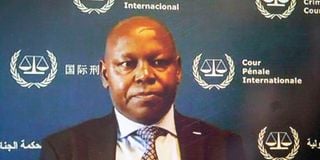Premium
Gicheru launches defence against ICC charges

Paul Gicheru makes first appearance before the ICC on 6 November 2020.
Lawyer Paul Gicheru says he is not criminally responsible for the alleged offences of offering Sh20.4 million bribes to witnesses of the International Criminal Court (ICC) in the crumbled case against Deputy President William Ruto.
In a defence brief filed by his advocates, Mr Gicheru wants the The Hague-based court to drop the eight counts of corruptly influencing witnesses.
He argues that the evidence held by the prosecutors was obtained from unreliable witnesses and untestable hearsay.
The lawyer is accused of interfering with the witnesses through bribery and intimidation, leading to vacation of the crimes-against-humanity case that was facing Dr Ruto and radio presenter Joshua Sang.
The case stemmed from the 2007/8 post-election violence that saw more than 1,100 people killed and over 650,000 others displaced.
Should he be found guilty, the lawyer faces up to 40 years in jail since each count attracts a prison term not exceeding five years, according to Article 70(3) of the Rome Statute.
But, through defence counsels Michael Karnavas and Suzana Tomanović, he has rejected and contested all the counts, saying, the prosecution’s case is full of contradictory and inconsistent evidence from unreliable witnesses.
He also says the pre-trial disclosure material (evidence) furnished to him by the Office of The Prosecutor (OTP) supports neither the prosecution’s version of events, nor its legal conclusions.
The defence counsels have argued that the Pre-Trial Chamber’s (PTC) decision to confirm charges against Mr Gicheru is not evidence.
Hence, no opinions should be formed, or conclusions drawn from the OTP’s representations in the trial brief, or any claims made of lack of objections to the OTP’s story based on its version of the facts.
The lawyers have also declined to disclose how Mr Gicheru intends to challenge the charges against him, saying he is under no obligation to do so under the Rome Statute and the fair trial rights afforded to him.
Disclosure, they say, may assist the OTP in mounting a rebuttal to the defence case during its case-in-chief.
The advocates add that, as the case will be scrutinised through the confrontation process, the facts will attest to a lack of any legal wrongdoing by Mr Gicheru regarding the events.
“The OTP trial brief contains no evidence which the Trial Chamber may or should rely on in making its findings of fact and conclusions of law,” say the defence counsels.
They have also stated that the prosecution is attempting to try the case through prior recorded testimony. The court’s Trial Chamber III, composed of Judge Miatta Maria Samba, has since scheduled the opening of the trial for February 15, 2022.





